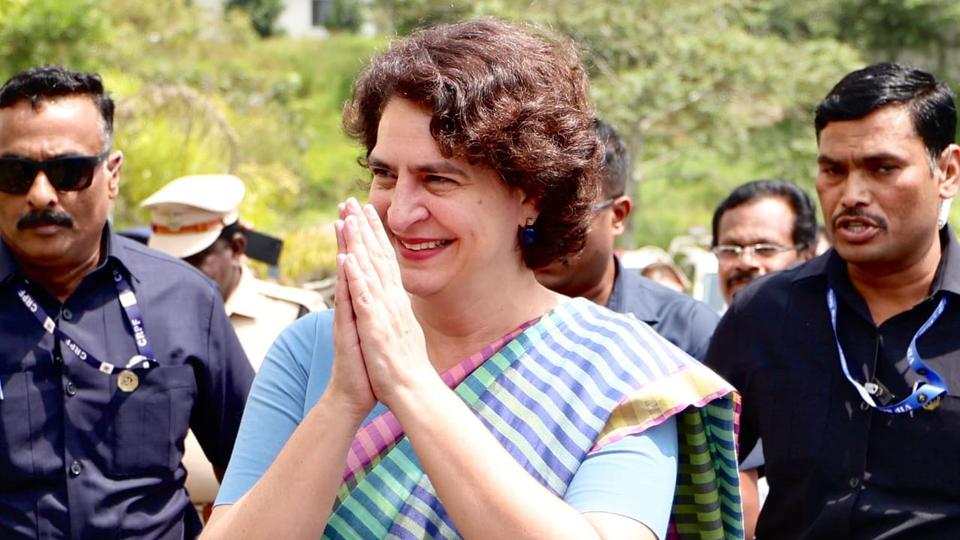Priyanka Gandhi’s Financial Disclosures alleged to be false and concealed, in a turn of events likely to impact the political landscape of Wayanad. Priyanka Gandhi Vadra’s financial disclosures, submitted as part of her nomination for the upcoming elections, have become a focal point of controversy. The BJP has alleged discrepancies in the income and asset declarations provided to the Election Commission (EC), accusing Priyanka of incomplete disclosure and calling for the cancellation of her election nomination. The Election Commission, now in the process of reviewing the affidavit, faces mounting pressure to scrutinize the alleged inconsistencies.
Priyanka Gandhi’s Financial Disclosures Challenged on account of under valuations & concealments:
The BJP’s objections target several aspects of the affidavit, including reported under valuations of real estate properties, omitted foreign assets, and inconsistencies in declared income from investments. Priyanka Gandhi Vadra’s disclosed assets include properties in Gurgaon and Jaipur, along with investments in various mutual funds and stocks. BJP leaders argue that the declared property values do not reflect the current market rates, citing one Gurgaon property listed at ₹5 crore but, according to BJP’s estimation, it has a market value exceeding ₹15 crore. These are the basis of challenge of Priyanka Gandhi’s Financial Disclosures.
Legal Framework Under the Representation of the People Act
This dispute brings into focus critical sections of the Representation of the People Act, 1951, specifically those mandating full financial disclosure. Under Section 33A, candidates must file a complete affidavit detailing income, assets, and liabilities, and Section 36(2) authorizes the EC to reject nominations based on inaccuracies or omissions. Further, Section 125A penalizes furnishing false information with imprisonment, a fine, or both. Given these provisions, BJP’s call for cancellation stems from their interpretation that Priyanka Gandhi’s Priyanka Gandhi’s Financial Disclosures in the affidavit violates these requirements.
Supreme Court’s Directive on Transparency in Election Disclosures
The Supreme Court has underscored the need for full disclosure in several landmark rulings, including Union of India vs. Association for Democratic Reforms and Lok Prahari v. Union of India. These judgments mandate that election candidates must declare all assets and income to foster transparency and enable voters to make informed choices.
The Supreme Court’s ruling in Resurgence India vs. Election Commission of India made clear several fundamental aspects of a citizen’s right to know about their representatives and the obligation of candidates to disclose relevant personal information in a transparent and accountable manner. Key points from the judgment include:
- Voter’s Right to Know: The court emphasized that the right of citizens to be informed about the background of their candidates is an integral part of the freedom of speech and expression, as protected under Article 19(1)(a). This “right to know” empowers voters to make educated choices at the ballot box, which is essential to the democratic process.
- Responsibility of Candidates: According to Section 33A of the Representation of the People Act, 1951, candidates are obligated to disclose information regarding their criminal records, assets, liabilities, and educational qualifications. The judgment mandates that candidates must mark any irrelevant fields in the affidavit explicitly as “NIL” or “Not Applicable,” rather than leaving them blank. Failure to comply would result in the rejection of the nomination paper by the Returning Officer.
- Role of Returning Officers: The judgment assigns Returning Officers a pivotal role in scrutinizing nomination papers. If a candidate fails to provide complete information, even after a reminder, the Returning Officer is empowered to reject the nomination. The court clarified that this power should be exercised judiciously to prevent misuse, ensuring that candidates cannot bypass scrutiny by submitting incomplete affidavits.
Legal Consequences for False Information: The court also referenced Section 125A of the Representation of the People Act, which holds candidates accountable for providing false information. However, in cases where a nomination is already rejected due to incomplete information, further prosecution is unnecessary, as the rejection itself serves as a deterrent
Failure to adhere to these standards has been cited by the BJP as grounds for immediate cancellation of Priyanka’s nomination.
Congress Defence Against Allegations:
Responding to the headline, Priyanka Gandhi’s Financial Disclosures Challenged Before EC, Congress spokespersons have rejected the claims as “politically motivated.” Congress representatives insist that Priyanka’s disclosures align with Election Commission requirements, dismissing the BJP’s stance as a distraction from broader campaign issues. The Congress legal team has asserted that any discrepancies in valuations are due to fluctuating market conditions, and no foreign assets exist requiring disclosure.
Election Commission’s Role:
With Priyanka Gandhi’s Financial Disclosures Challenged Before EC, the Election Commission’s review will involve verifying the values and assets listed against available records, potentially setting a precedent for stricter scrutiny of candidate financial declarations. The outcome of this case could affect Priyanka Gandhi Vadra’s candidacy and establish new standards for financial transparency in Indian elections.
For more coverage on this developing story, stay connected with:





